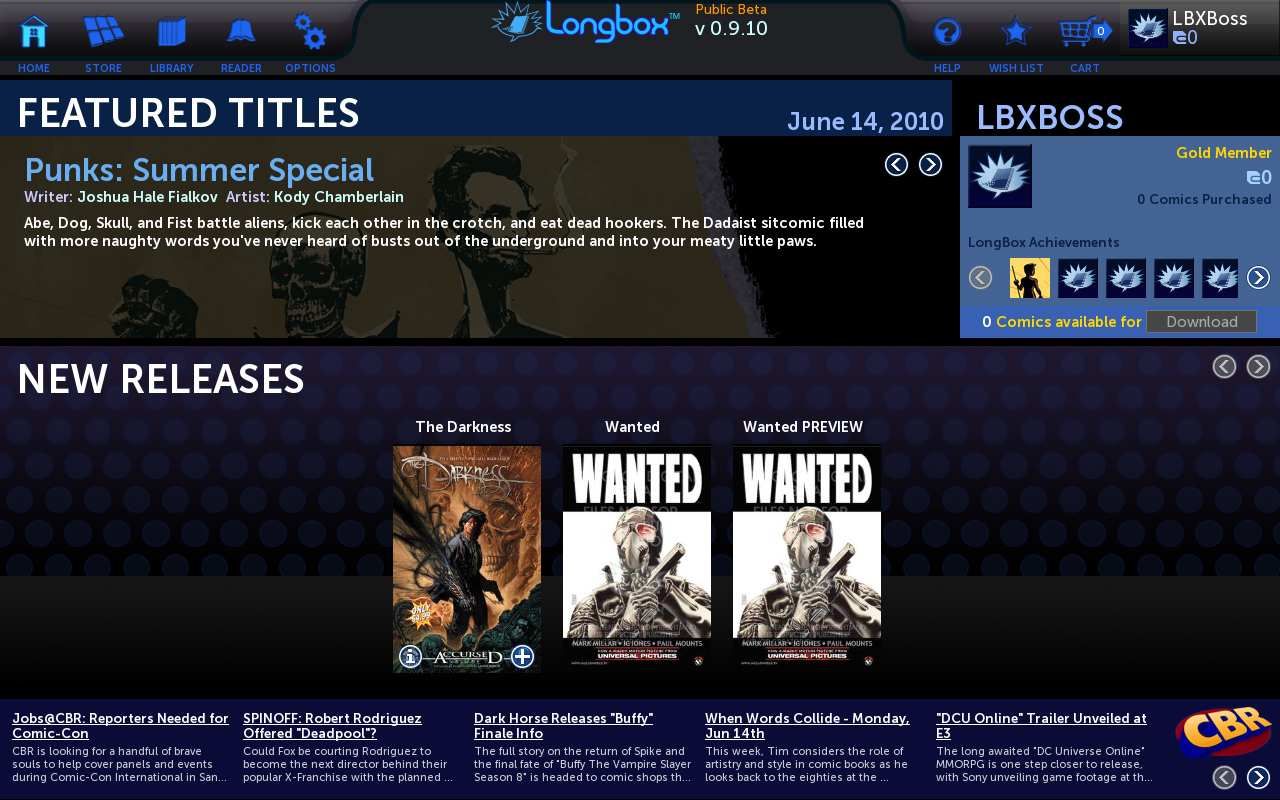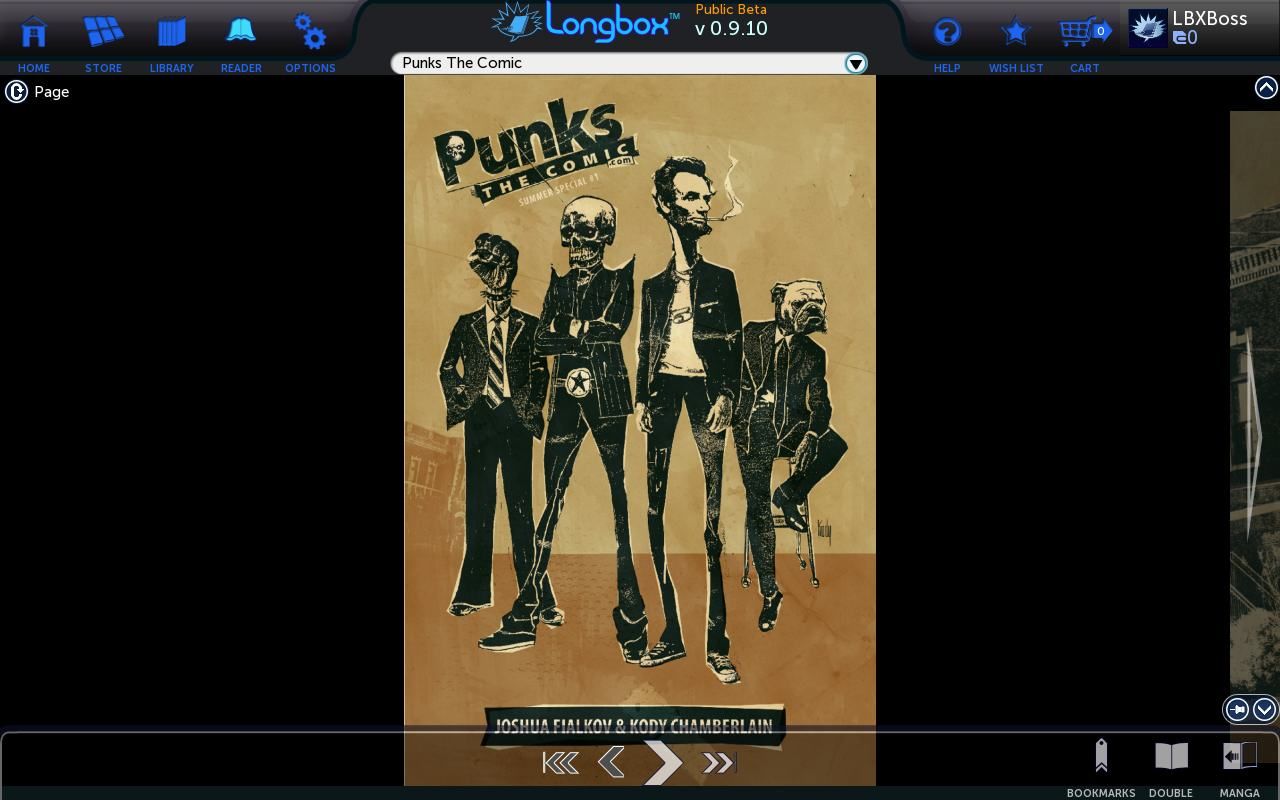The Longbox digital comics distribution system was first announced in June 2009 and was universally described as "iTunes for comics." In fact, it is much more than that: A platform-independent application that allows the user to buy and read comics digitally and move them from one device to another. Unlike the iTunes store, Longbox won't have strict content restrictions, but users can create subaccounts that will only allow browsing, purchase, and reading of comics below a given age rating. The public beta version becomes available today with a handful of titles, and developer and CEO Rantz Hoseley says new content will start appearing on a weekly basis beginning on June 29 and available at a discount "in recognition that we are still in beta."
I tried out the private beta last weekend, and the experience was pretty seamless: You look at a display of covers, buy the ones you want, download them, and read them in a comics reader on the screen. Hoseley talked to me last week about how Longbox will evolve as a platform for readers and for publishers.
What devices will Longbox launch on?
The upcoming launch is Mac and PC. Tablets, both in terms of the Apple generated ones and the Android and Windows Mobile 7 powered ones, will be early fall. We hope to be able to announce the date on that by San Diego, but the contract negotiations are taking a little longer than we would prefer. At the very least, in a worst case scenario we will be having it installed on the devices in question by New York Comic-Con.
To give Apple credit, building a comic reader is an easy thing to do. Putting together a good one is harder. Putting together a comprehensive one that allows readers to make recommendations, to manage their content, to make it easy for people to both access new content and for publishers and creators to get content into the system on a normal production cycle, so there is actually momentum and scale built into it, that's much harder to do. Apple has done a lot of invention in terms of the app store and iTunes, and those things are going to go through growing pains.
Tell me about your plans to have Longbox be in an OEM position on a digital tablet.
We are in OEM negotiations with a very high profile Android powered tablet. We hope to have details announce at San Diego, but the current plan is at New York Comic Con in October, we will be showing the device with Longbox installed on it and running, because the current understanding is that device will be on the market the second week of November.
How much will the comics cost?
The general rule is single-issue comics are a dollar. The first-run comics that come out sequentially on Longbox prior to print and then will come into print as collections are around $2, and if a book has enhanced content, i.e. there is making-of content, concept art, audio interviews or video examples, multi language support for instance, those would run in the $2 range as well for a single issue.
It's up to the individual publishers to set the price point, but we are stressing to publishers that unless there is a very good reason to go outside [their recommended pricing] we suggest you don't because it's going to impact user adoption rates.
If I already have iTunes, why would I want Longbox?
First of all, it's a focused experience. It's just comics, and unlike the Apple store, I don't have to jump through any strange hoops in order to manage my content or archive my content or use my content in ways that are logical to me. If I have content I purchase through Longbox, I can drag it to an external hard drive, bring it to the office and plug it into the computer there, and access all that content through Longbox.
One of the things we actually have a patent pending on is subaccounts, so that as a parent, for instance, you can create a subaccount that you put a rating restriction on so your kid can't read anything over C-13, which is the equivalent of PG-13 content. They can browse the store, you can set it so they can add items to a wish list, and you can be confident they are not seeing anything you are not comfortable with not only in terms of the store but also anything they can see that is within your purview.
In terms of the content providers, we don't have the kind of gating that Apple has. As an independent creator, it's very difficult to get anything onto iTunes. iTunes doesn't have a [comics] reader built into it, and it is not built to handle a large mass of sequential images. If you have Blankets or Bone, your experience purchasing that through iTunes and then having a third-party reader to read it is not going to be exactly enjoyable. We really want to keep that experience as clean and focused as possible.
Are you looking to convert longtime comics readers to digital or bring new readers to comics?
I really understand the retailer concern about bifurcation and cannibalization and that everyone is going to go to digital devices and not go to the shops, but I think by and large you are looking more at the lapsed readers or people who are fans of comics and got out of comics because frankly it became too much of a hassle to keep track of which miniseries was crossing over with which event, combined with the ever-increasing price point, the audience getting older and having real world responsibilities, and four-dollar comics.
If you have Mom's Cancer or a book like Fun Home that gets Time Magazine's Book of the Year, those are books that are getting writeups and that are being read by people who don't regard themselves as "comics readers," and you want that content easily accessible to them. If I, as a fan, have issues finding a copy of Fun Home—I know Alison Bechdel and I know what the book looks like, and yet in both comics shops and bookstores I am having issues finding it—that is a huge lost opportunity for us as an industry. We are not going to grow the market at all if people who are not comic book readers can't access it.
All the content in Longbox has a digital identity in terms of a store front and in terms of having the ability for Robot 6 or Heidi Macdonald at The Beat or Tom Spurgeon at The Comics Reporter doing an article and being able to actually refer over to that and allow them to purchase the content. That's a huge thing. Otherwise, the person has to be able to remember this for the 20 minutes past when they are reading the article, and if they are in a bookstore they have to be able to remember that one book they were reading about. I see this as a critical role we have in expanding the market for casual readers and those who read comics but don't consider themselves comics readers, to bring them into the fold. Most people like comics. There is a reason why even in this day that newspapers are shrinking they still have comics sections. But you won't get those people to go into a comics shop.
Do you have a minimum number for sales, or will you take comics from any publisher?
There is a quality issue more than an order threshold thing. As far as independent publishers and creators, a huge part of the reason for our doing this is the Diamond restriction. Look at the last generation of new creators—Rick Remender, Becky Cloonan. Under the new restrictions, those people wouldn't have broken through. A huge part from Day 1 was how do we expand the market, not just in terms of the audience and who can buy it but also in terms of giving newcomers an established, clear-cut way to get their content out there. As part of that, there is a submission process: If a new and unestablished independent creator wants to publish through Longbox, they have to submit a business template that shows that they clearly understand what is involved in terms of promotion and publication, to ensure that if we are putting our time and money and advertising behind the article we are confident that they will deliver these books on time and have consistent quality.
So if people are rejected, they will know why?
Exactly, and whether they agree with that or not, it will give them a starting point where they can learn and grow from it or say "F you, I'll do it my way."
What sort of comics do you expect to carry? Will it be a mix?
I think it is absolutely essential. Going back to growing the market again, you're not going to get people like my wife and her friends on board with a comic where it's a DC or Marvel book. and that's even going into the more diverse stuff that DC has on like Vertigo.
There is one publisher that we are working with that isn't really well known in the hardcore comic fan circles, Arrow Publications, they do romance comics, that's all they do, they do good sales via direct internet orders but again there is the limitation of getting it in front o the audience. People will gladly pay money for romance stories, and that kind of dramatic representation—or melodramatic representation—is alive and well. You can't make a judgment call on what entertains someone just because it is not your personal cup of tea. My daughters are huge fans of iCarly, a TV show on Nickelodeon. It's aimed very squarely at teens. I can recognize objectively that the writing is better than most tween oriented shows, but again, I'm not the audience for that. if Nickelodeon wanted to do an iCarly comic on Longbox, would I want to read it? Probably not. But would it help grow the comics industry? Absolutely. That's what we have to look at. If we re really serious about growing this, we can't be really serious about getting people tor read Batman. That is not growing the industry. The people who are receptive to Batman are reading Batman already.



